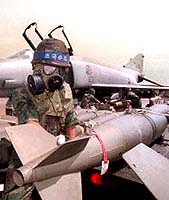| . |  |
. |
 Seoul (AFP) November 20, 1999 - Progress was made in talks with the United States to extend South Korea's missile range, US and South Korean officials said Saturday.
Seoul (AFP) November 20, 1999 - Progress was made in talks with the United States to extend South Korea's missile range, US and South Korean officials said Saturday."The discussions on the ROK (South Korea) missile issue were productive and concrete, bringing the US and ROK positions closer together," the US embassy said in a press release. "Some differences remain, however, which the U.S. hopes will be resolved as soon as possible," it said. Caption: Members of the South Korean Air Force using gas masks display how to attach bombs to their F-4E fighter jets, at Osan air base 19 August 1999. South Korea and the US military took part in the 12-day 'Ulchi Focus Lens' exercises, which started 16 August, intended to deter any North Korean attack. The exercises have been held annually, but were given greater significance this year due to fears that North Korea will soon fire its Taepodong II new long-range missile that could hit parts of the United States. Photo Copyright AFP A South Korean official told journalists the two sides narrowed down differences in most key points during the talks, which extended into Saturday for a three-day session. "But because the differences are so wide over the remaining points, it will be difficult to conclude the talks at one stroke," the official was quoted as saying by the Munhwa Daily. News reports here said the two sides have yet to agree on the extent of US technology assistance and on how to ensure "transparency" in increasing the ranges of South Korean missiles beyond the current 180 kilometers (108 miles). The two sides intend to meet again soon, at a time and place yet to be determined, the US embassy said. The US delegation was led by Assistant Secretary of State for Nonproliferation Robert J. Einhorn, while the South Korean side was headed by Director General For North American Affairs Song Min-Soon of the Ministry of Foreign Affairs and Trade. The American team will visit Tokyo November 21-23 for talks with Japanese officials on the future US-North Korea missile talks. US and North Korean officials ended in Berlin Friday a week of "serious and constructive" talks on improving relations. At a previous round of talks in Berlin in September, North Korea agreed to halt its missile development programme in return for the partial easing of US economic sanctions against Pyongyang. The global Missile Technology Control Regime, aimed at stopping the spread of rockets, bans trade in missiles with a range of over 300 kilometers with warheads of more than 500 kilograms (1,100 pounds). Both South Korea and the United States have endorsed the regime. Under a 1970s agreement with Washington, Seoul agreed to set its missile range at 180 kilometers (108 miles) and promised to abide by US-led global non-proliferation rules in return for receiving US missile technology. But South Korea now wants to formally boost the range to 300 kilometers for deployment and 500 kilometers for scientific research and development. Seoul has complained that its existing missiles cannot hit any targets further north than the North Korean capital Pyongyang, falling far short of its perceived need to have all North Korean territory within range. Stalinist North Korea last August test-launched a medium-range Taepodong I missile over Japan. Copyright 1999 AFP. All rights reserved. The material on this page is provided by AFP and may not be published, broadcast, rewritten or redistributed.
MILSPACE
Asian MilSpace Issues At TerraDaily
|
| |||||||||
| The content herein, unless otherwise known to be public domain, are Copyright 1995-2016 - Space Media Network. All websites are published in Australia and are solely subject to Australian law and governed by Fair Use principals for news reporting and research purposes. AFP, UPI and IANS news wire stories are copyright Agence France-Presse, United Press International and Indo-Asia News Service. ESA news reports are copyright European Space Agency. All NASA sourced material is public domain. Additional copyrights may apply in whole or part to other bona fide parties. Advertising does not imply endorsement, agreement or approval of any opinions, statements or information provided by Space Media Network on any Web page published or hosted by Space Media Network. Privacy Statement All images and articles appearing on Space Media Network have been edited or digitally altered in some way. Any requests to remove copyright material will be acted upon in a timely and appropriate manner. Any attempt to extort money from Space Media Network will be ignored and reported to Australian Law Enforcement Agencies as a potential case of financial fraud involving the use of a telephonic carriage device or postal service. |